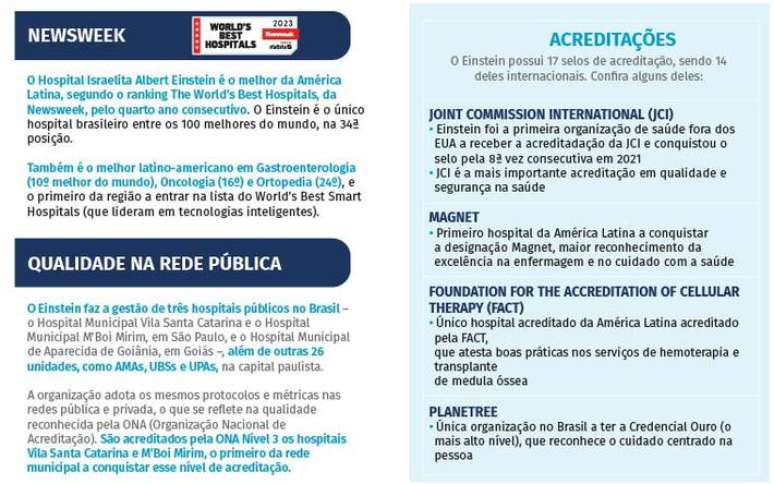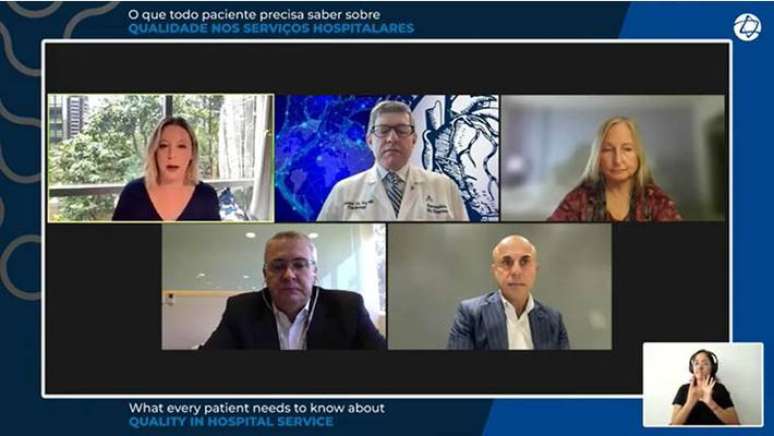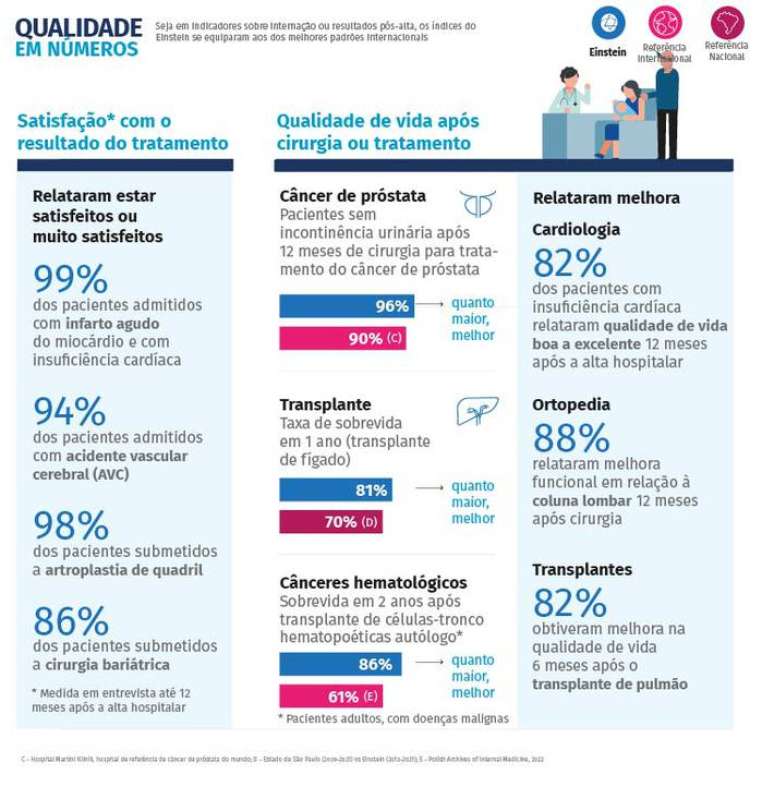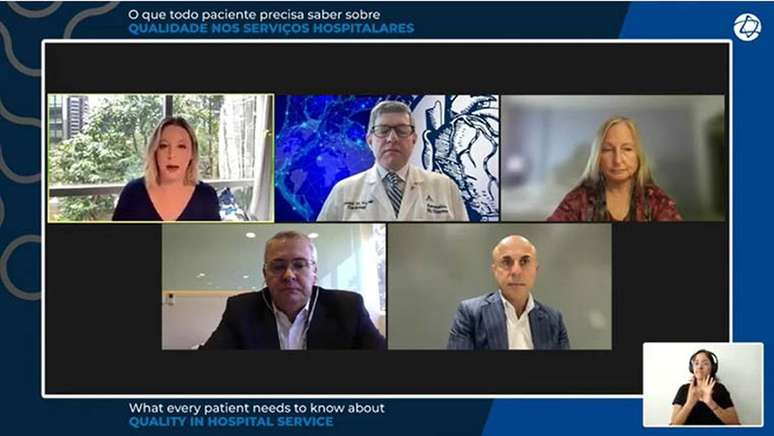In the debate, experts underline the importance of building a culture of quality and safety and listening to the patient
Whether it’s a routine checkup or a more complex case, what is important to consider when choosing the best health service? What can the patient expect from the care or treatment to which he will be subjected? How can surgery really affect your quality of life?
html[data-range=”xlarge”] figure image img.img-06d59bde9bac11114242620e701f0d2fqxbsvfpi { width: 774px; height: 436px; }HTML[data-range=”large”] figure image img.img-06d59bde9bac11114242620e701f0d2fqxbsvfpi { width: 548px; height: 309px; }HTML[data-range=”small”] figure image img.img-06d59bde9bac11114242620e701f0d2fqxbsvfpi, html[data-range=”medium”] figure image img.img-06d59bde9bac11114242620e701f0d2fqxbsvfpi { width: 564px; height: 318px; }
The answers to these questions are not always accessible to patients, but they should be. Gathered in a debate on hospital quality sponsored by the Albert Einstein Israelite Hospital last week, Brazilian and foreign specialists highlighted the importance of transparency on the data that allow treatment to be evaluated not only within the hospital, but also after the discharge, and to involve each patient more and more throughout the process.
“An organization that seeks to deliver the best result [resultado da assistência em saúde] they need to know how to properly inform their indicators and use all resources to make this information understandable,” said Sidney Klajner, digestive surgeon and president of Einstein, during one of the four panel discussions.
Pedro Delgado, vice president of the Institute for Healthcare Improvement (IHI), an organization dedicated to promoting quality in healthcare worldwide, stressed in his speech that “the best hospitals in the world share data and this leads to improvements “. With transparency on the indicators referring not only to hospital safety, but also to the clinical improvement of patients and their post-care satisfaction, the patient has valuable information to help him in his choices.
Another important reference is the recognition of the healthcare organization expressed by the international accreditations achieved. Einstein, who today holds more than 17 accreditation seals, 14 of which are international, pioneered most of these awards in Brazil. In 1999, the organization was the first organization outside the United States to receive accreditation from the Joint Commission International (JCI), the premier accreditation in healthcare quality and safety processes.
For the quality recognized by the accreditations to really be a daily concern, hospitals need to create an internal culture focused on this care. “Everyone in the organization needs to engage in this in their daily lives and everyone needs to understand that quality and safety are priorities,” said Miguel Cendoroglo, chief medical officer at Einstein.
Technology and training
Investment in technology and innovation is essential to deliver the best care, but must be closely linked to an ongoing effort to educate and train healthcare professionals. “Perhaps robotic surgery is the great example of investing in a technique that, while beneficial, can also carry risks if the hospital and its professionals are not willing to put the robot to work,” said Klajner . “This culture needs to exist in the organization. And, because we understand that training is essential, Einstein has become a certification center for robotics in several areas.”
In oncology and cardiology, topics discussed in one of the panels, the need to form multidisciplinary teams and install a culture of listening to the patient in hospitals is as important as advances in techniques and equipment.
“Cancer requires a flawless chain of care, including diagnosis, cure and aftercare. Hence the difficulty of creating advanced cancer centers, as this chain of excellence must be anchored in efficacy and safety,” said the oncologist Fernando Maluf, member of the Management Committee of the Einstein Oncology Center.
For Linda Bosserman, an oncologist in City of Hope, USA, it is essential to personalize treatment for each cancer patient, both through genetic technologies, with precision medicine, and by sharing the decision about their treatment with them. “It is necessary to clearly explain what the treatment options are, with their side effects. It is necessary to understand the needs of each patient and what their goal is in dealing with cancer, so that a shared decision can be made,” he pointed out.
Cardiologist Edward Fry, who chaired the American College of Cardiology last year, highlighted that cardiology too has seen an explosion in the search for new technologies, therapies and approaches, but that one of the most important advances in terms of quality In fact, it was “stepping back from the more technical indicators and focusing on patient-reported outcomes.”
“How do you perceive the patient? Knowing this is fundamental. If you think the surgery was a success, but the patient feels terrible, that is not quality. So we need to hear from patients what quality is for them: if they have relieved your symptoms, if it met your expectations,” Fry said.
He points out that there is a major national cardiology data network in the US that already considers patient experience data. In 2012, Einstein created the Outcome Cell, which monitors a patient’s initial health status, as well as its long-term evolution. Nearly 5,000 cardiovascular patients were followed up between 2017 and 2022, and results show that 99% of patients admitted for acute myocardial infarction and heart failure reported being “satisfied or very satisfied” with the outcome of their treatments.
“The patient is at the center of attention of the multidisciplinary team, which welcomes you from the pre-hospital phase to the post-discharge phase. This has a great impact on outcomes and quality of life”, explained Fernando Bacal, coordinator of the Heart Einstein’s failure and transplant. Bacal highlighted in his speech the progress, in recent years, of the protocols and metrics of the hospital’s cardiology program, comparable to the best international parameters. “We managed protocols, nurse leaders, active case finding, locating the best prescription and guidance, and post-discharge follow-up, avoiding readmissions,” he said.
Better service requires a culture change
Einstein has invested, for five decades, in the search for quality practices that are global references.
Having the certainty that, when you walk through the hospital door, you will receive the best treatment and the most efficient recovery possible, to return to your activities with quality of life as soon as possible. The paths that lead to ensuring this serenity for the patient require healthcare organizations to invest years in the training of professionals and in the change of internal culture, involving all those involved in patient care.
Quality and patient safety have always been a concern since the founding of the Albert Einstein Israelite Hospital in 1971. In the following decades, Einstein followed the practices adopted in the world’s best hospitals with the aim of providing a healthier life.
Thus, it became the first organization outside the United States to be accredited, in 1999, by the Joint Commission International, which attests quality and safety processes in healthcare, and the first in Latin America to obtain hospital designation Magnet, which recognizes excellence in nursing. Today, Einstein has 17 accreditation seals, 14 of which are international.
Ensuring excellence in quality and safety has become an obligation, and Einstein’s current challenge is to advance more and more, with innovation and intelligence, in the search for indicators that allow us to look at the patient’s entire journey, from diagnosis to post-treatment of the disease, considering their satisfaction and a better quality of life. All this with transparency in the disclosure of all support metrics.
This is one of Einstein’s concerns for the units he manages, both in the private and public systems. With the clear aim of seeking equity in health, the organization adopts the same protocols and parameters as its private service in the three hospitals and 26 outpatient clinics of the SUS (Sistema Único de Saúde) that it manages.
Einstein’s commitment is to extend access to health to the greatest number of people, without losing the quality and excellence guaranteed by its ecosystem, which includes assistance, teaching, research and innovation.




Source: Terra
Ben Stock is a lifestyle journalist and author at Gossipify. He writes about topics such as health, wellness, travel, food and home decor. He provides practical advice and inspiration to improve well-being, keeps readers up to date with latest lifestyle news and trends, known for his engaging writing style, in-depth analysis and unique perspectives.









